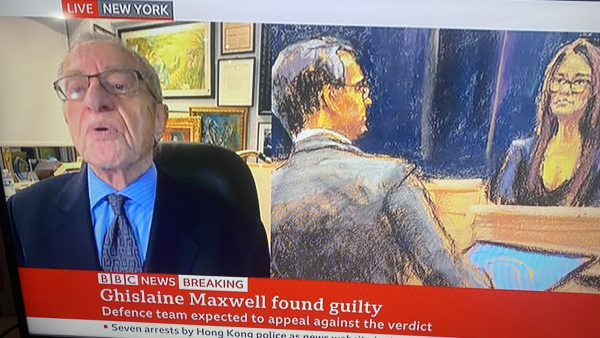The trial of Ghislaine Maxwell continues to make worldwide headlines for a variety of reasons after the British socialite was found guilty on several charges of grooming underage girls recruited for a sex-trafficking ring led by convicted Jeffrey Epstein.
However, the British Broadcasting Corporation has come under fire lately after hosting Jeffrey Epstein's former lawyer, Alan Dershowitz, to comment on the conviction of Epstein's long-time associate Ghislaine Maxwell.
Alan Dershowitz himself is facing accusations of sexual assault by one of Epstein's victims, despite his denial.
BBC interview Alan Dershowitz over Ghislaine Maxwell - a new low BBC, a new low. pic.twitter.com/dapu03gkAl
— Steve E Ennever (@MusicMiscreant) December 29, 2021
The interview prompted angry reactions by people who protested hosting associates of Jeffrey Epstein. Some online people also linked the BBC decision to host Dershowitz to the possible trial of British Prince Andrew of York, who is facing a lawsuit by American-Australian Virginia Giuffre, who claims she was trafficked by Epstein and Maxwell to have sex with Prince Andrew when she was only 17-years old, in 2001.
The BBC having Alan Dershowitz as an expert commentator on the Maxwell verdict is grotesque, and a complete disgrace for a public service broadcaster. pic.twitter.com/M19QfbAdOh
— Christian Christensen (@ChrChristensen) December 30, 2021
When the Ghislaine Maxwell verdict dropped, you expected the BBC to be on it, but what wasn't expected was Alan Dershowitz to be their go-to guest for comment, speaking of Prince Andrew when he's accused of Epstein child sex abuses as well! Explanation please Beeb! #DamoRants pic.twitter.com/8sOAW52yKN
— Damien Willey #YourNHSneedsyou (@KernowDamo) December 30, 2021
Commentators attacking BBC wondered if the British public broadcaster's interview with Jeffrey Epstein's former lawyer is an attempt to back Prince Andrew in the upcoming legal challenge, by introducing more people to "justify" Epstein's acts or provide an insight that defends him.
This week, the director-general of BBC Tim Davie attributed the interview to "a personal error," explaining that "the interview had breached editorial standards."









